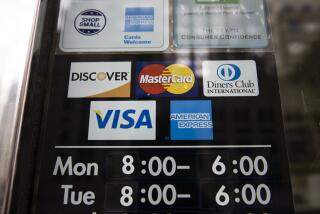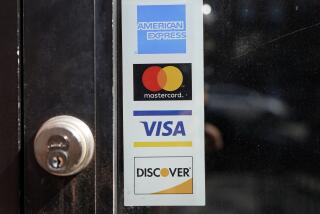Bank Credit Cards Raked It In in 1992
- Share via
The banking industry’s credit card profits rose by nearly one-third last year to $3.3 billion, a newsletter reports, reflecting an improvement in the financial health of Americans from 1991.
The trade publication Credit Card News attributed the industry’s performance in part to a decline in delinquent accounts, a problem that plagued the industry in 1991 and caused profits to plunge. Also contributing to bank profits in 1992, according to the newsletter:
* A boost in late fees to an average of $12 from $10 in 1991, and an increase in over-limit fees charged on accounts.
* A drop in what banks pay to borrow money to finance unpaid credit card balances, due to an overall decline in interest rates.
Looking ahead, the newsletter said profits this year could be lower. The newsletter said an expected increase in interest rates this year will squeeze credit card profits, while a continued weak economy may lead to a slowdown in credit spending.
*
No walker ban: A government agency has denied a petition to ban baby walkers as “a lethal form of transportation.”
The Consumer Products Safety Commission has instead directed its staff to look into developing a design standard to prevent walkers from rolling down stairs.
Arguing that walkers are dangerous and sometimes deadly, the American Medical Assn. and the American Academy of Pediatrics asked the commission to ban them in the United States. Canada has already banned the devices, which are seats with rollers that help babies learn to walk.
Manufacturers have maintained that walkers are safe when babies are properly supervised.
*
A coffee break: Here’s another premium brand trying to have it both ways. Starbucks Corp., the premium coffee company, is a major supplier of discount coffee to the Costco wholesale store chain.
Last year, Starbucks sold more than $3 million worth of coffee to Costco, making the discount club chain its largest customer. The coffee is available at many of Costco’s West Coast outlets, including stores in Laguna Nigel and Canoga Park.
Starbucks says its special blend for Costco is just as good as the premium coffees sold in its own coffee stores. The difference is nonetheless palatable: At about $8 for a two-pound bag, the Costco blend is half the price of premium-priced Starbucks coffee.
*
Toy recall: The U.S. Food and Drug Administration said 11 toy china tea and dinner sets are being recalled because they contain potentially harmful levels of lead.
The FDA urged parents to return the sets to stores where they were purchased for a refund. The agency also urged parents to consult a physician if children have been exposed to lead over a long period by repeatedly drinking tea or juice from the cups.
Lead is a toxic metal that if taken in sufficient quantity can result in learning deficits, especially in young children.
The FDA said the sets being recalled are a 12-piece Chilton Toys tea set; a 16-piece Barbie china dinner set and a 12-piece Barbie china tea set; a 12-piece Holly Hobbie china tea set and a 16-piece Holly Hobbie china dinner set; a 13-piece Cabbage Patch Kids china set; a 15-piece and a nine-piece Campbell’s Soup Time china set; a 13-piece Friendly Home Parties porcelain tea set; a 17-piece Lillian Vernon porcelain tea set, and a 13-piece McCrory’s china tea set.
*
Taking stock: A leading discount brokerage says its clients are discouraged about the economy and lack confidence in President Clinton’s plans.
New York-based Quick & Reilly said that more than half of 500 clients surveyed disapprove of Clinton’s performance in economic matters. The brokerage firm said that less than a third of those surveyed are optimistic about the stock market, down from more than half who said they were optimistic in January.
“Our investors appear uncertain as to whether the course charted is viable or even wise,” said Thomas C. Quick, president of the brokerage.
Apparently, uncertainty isn’t bad for Quick & Reilly’s stock-trading business. Nearly two-thirds of customers surveyed traded stocks during the first quarter, about the same as in January. And most of them bought other stocks.
More to Read
Inside the business of entertainment
The Wide Shot brings you news, analysis and insights on everything from streaming wars to production — and what it all means for the future.
You may occasionally receive promotional content from the Los Angeles Times.










